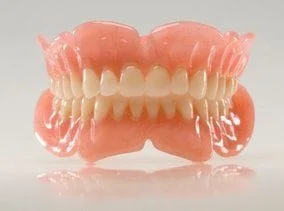DENTURES
A denture (false teeth) is a removable dental appliance which replaces missing teeth. They are made to closely resemble your natural teeth, help in chewing your food and enhance your smile.
There are two types of dentures - complete and partial dentures.
Complete dentures are used when all of the teeth are missing.
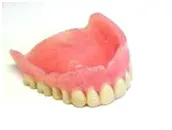
Partial dentures are used when some natural teeth remain. A Partial denture not only fills in the spaces created by missing teeth, it prevents other teeth from shifting. There are three types of partial dentures.
Acrylic Denture
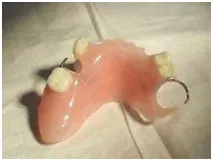
Valplast (flexible) Denture
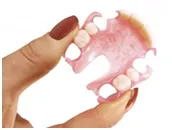
Cast Metal Denture
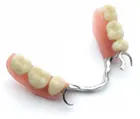
A Complete denture may be either “conventional” or “immediate.” A conventional type is made after the teeth have been removed and the gum tissue has healed, usually taking about 6 weeks. During this time the patient will go without teeth. Immediate dentures are made in advance and immediately placed after the teeth are removed, thus preventing the patient from having to be without teeth during the healing process. Once the tissues shrink and heal, the denture will usually have to be relined on the inside so that it fits accurately against the healed tissue.
Dentures are very durable appliances and will last many years, but may have to be remade, repaired, or readjusted due to normal wear and loss of bone over time.
Reasons for dentures:
- Complete Denture - Loss of all teeth in an arch
- Partial Denture - Loss of several teeth in an arch
- Enhancing smile and facial tissues
- Improving chewing, speech, and digestion
What does getting dentures involve?
The process of getting dentures requires several appointments, usually over several weeks. Highly accurate impressions (molds) and measurements are taken and used to create your custom denture. Several “try-in” appointments may be necessary to ensure proper shape, color, and fit. At the final appointment, your dentist will precisely adjust and place the completed denture, ensuring a natural and comfortable fit.
It is normal to experience increased saliva flow, some soreness, and possible speech and chewing difficulty, however this will subside as your muscles and tissues get used to the new dentures. It is also normal to have several adjustments after receiving a new denture in order to remove any sore spots on your gums.
You will be given care instructions for your new dentures. Proper cleaning of your new dental appliance, good oral hygiene, and regular dental visits will aid in the life of your new dentures.
